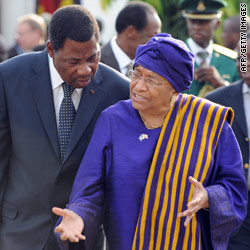Scammer
Banned

West African leaders warned they may use "legitimate force" to defuse an escalating crisis in Ivory Coast sparked by incumbent President Gbagbo's refusal to cede power.

[video]http://cnn.com/video/?/video/world/2010/12/24/sweeney.menage.gbagbo.cnn[/video]
At an emergency meeting Friday, West African leaders warned they will not hesitate to use "legitimate force" if necessary to defuse an escalating crisis in Ivory Coast sparked by incumbent President Laurent Gbagbo's refusal to cede power.
"In the event that Mr. Gbagbo fails to heed this immutable demand of ECOWAS, the Community would be left with no alternative but to take other measures, including the use of legitimate force, to achieve the goals of the Ivorian people," said a statement issued Friday by the 15-member Economic Community of West African States.
"Against the background of the parlous security situation, the heads of state and government hereby instruct the president of the ECOWAS Commission to convene without delay a meeting of the Committee of Chiefs of Defense Staff in order to plan future actions, including the provision of security along the Côte d'Ivoire-Liberia border, in the event that their message is not heeded," the statement said.
The regional bloc, which has already urged Gbagbo to acknowledge the results of Ivory Coast's presidential election and hand over power to his challenger, Alassane Ouattara, met in the Nigerian capital, Abuja.
Spokesman Patrick Achi said Ouattara hopes the West African leaders will be able to help end the turmoil. He accused Gbagbo of defying democratic ideals and instead embarking on new era of violence.
Speaking to reporters Friday, Ouattara thanked the international community for its support and urged Gbagbo to step down immediately, Achi said.
As Gbagbo continues to ignore the international outcry over his legitimacy, many in the region fear Ivory Coast could erupt in another bloody civil war.
Meanwhile, the Dutch Defense Ministry said on Friday that at the request of France, it had dispatched one of its ships to Ivory Coast to help evacuate European citizens in case the situation worsened.
The emergency economic bloc meeting in Nigeria was another regional attempt to find a solution to the troubling situation in Ivory Coast.
U.S. State Department spokesman P.J. Crowley said earlier this week that the United States and other countries were discussing with African nations the possibility of augmenting the existing U.N. force in Ivory Coast.
However, he said it was unclear what a U.S. contribution could look like -- forces of logistical support or something more indirect were among the options.
The African Union has suspended Ivory Coast from the organization "until such a time the democratically elected president effectively assumes state power." The World Bank has halted lending and disbursing funds to Ivory Coast and has closed its office in the country.
Global leaders have sent a clear message to Gbagbo: Recognize the people's will and step down. They have also harshly condemned purported human rights abuses committed by Gbagbo's backers.
On Friday, U.N. Secretary-General Ban Ki-moon welcomed the decision of the U.N. General Assembly to recognize Ouattara as the winner of the disputed Ivory Coast election.
"This important decision reflects the united position of the international community with respect to the legitimacy of the new government led by President Ouattara," a spokesman for the secretary-general said in a written statement.
Kyung-wha Kang, the U.N. deputy high commissioner for human rights, has said that between December 16 and Tuesday, human rights officers had "substantiated allegations of 173 killings, 90 instances of torture and ill treatment, 471 arrests and detentions and 24 cases of enforced or involuntary disappearances."
She added that the actual numbers may be much higher because "it has been impossible to investigate all the allegations of serious human rights violations, including reports of mass graves, due to restrictions on movement by U.N. personnel."
While acknowledging "the situation is very, very difficult to live" in, Charles Ble Goude -- the nation's youth minister under Gbagbo -- said Thursday the government is "dealing with that."
He said "the U.N. report is not correct," especially in its fingering fellow Gbagbo backers as being to blame for the recent violence. Instead, he accused Ouattara's supporters of using weapons at what had been billed as peaceful rallies to attack soldiers.
The violence is fallout of the November 28 presidential runoff, after which the country's Independent Electoral Commission named Ouattara the winner. But its Constitutional Council invalidated those results and declared that Gbagbo won.
Goude said that he and others in Gbagbo's circle couldn't accept the electoral commission picking Ouattara, noting that it announced its decision in a hotel that was also being used as Ouattara's headquarters.
While stressing a desire for talks on the issue, he said there is no intention for Gbagbo to forfeit a seat that he believes is rightfully his. "Why do you want someone who won an election to step down?" Goude said. "The president has been elected."
The international community has largely blamed Gbagbo's backers for inciting various abuses, which Kang said are reminiscent of violence that plagued Ivory Coast in 2004.
"The political stalemate has been characterized by the use of excessive force by the supporters of ... Gbagbo to repress public gatherings and marches; harassment and intimidation; arbitrary arrest and detention; torture; disappearances; and extrajudicial killings," Kang said Thursday at a special session of the U.N. Human Rights Council in Geneva, Switzerland devoted to the political crisis in the Ivory Coast.
